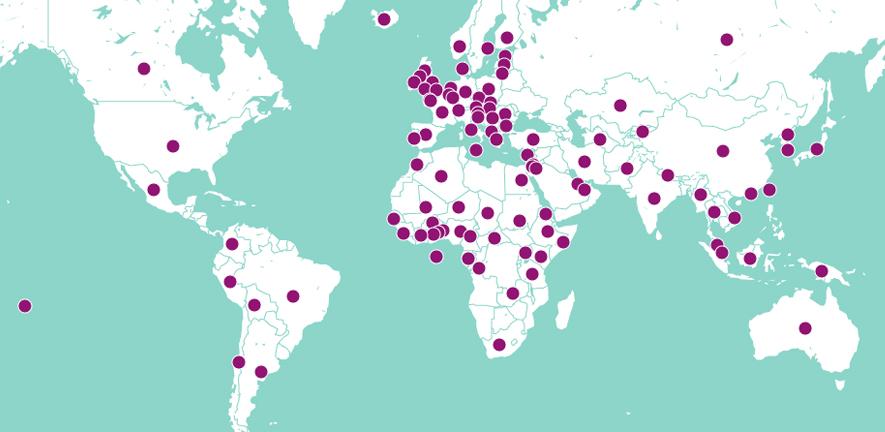
Submitted by Rachel Aucott on Wed, 11/05/2022 - 09:29
Cambridge’s global reputation in Biological Sciences recognised in REF 2021
The results from the latest Research Excellence Framework (REF) have highlighted the global impact of Cambridge’s research in the field of Biological Sciences.
96% of Cambridge’s overall submissions within the Biological Sciences Unit of Assessment (UoA5) – to which our department made a significant contribution – have been rated as ‘world leading’ or ‘internationally excellent’, demonstrating the major impact that researchers in our department are making every day.
The REF is the system for assessing the quality of research in UK higher education institutions and is undertaken by the four UK higher education funding bodies: Research England, the Scottish Funding Council, the Higher Education Funding Council for Wales, and the Department for the Economy, Northern Ireland.
Among the data submitted by universities and other institutions are case studies that describe the impact of their research – where they have made a difference to the environment, society, health, the economy, for example.
The Department of Zoology returned some 38 academics to the REF 2021 within the Biological Sciences unit of assessment. 66% of Cambridge’s submissions in Biological Sciences were awarded the highest rating of 4* overall, meaning they are ‘world-leading’. This is an increase from 52% in 2014. A further 30% of submissions were rated 3* overall (internationally excellent).
The average weighted score – the ‘grade point average’ – for Cambridge Biological Sciences is 3.61. This compares to 3.37 in 2014.
Professor Howard Baylis, Head of the Department of Zoology, said:
“I am delighted that our department’s research contribution to the University’s Biological Sciences submission has been recognised as globally important. Performing exciting research at this level is a team effort that depends on everyone in Zoology and everyone in the department should be very proud of what we have achieved. We are also grateful to our wide range of funders who provide the opportunity for our researchers to pursue inventive and rigorous science, to tackle the really exciting and important questions in animal biology and to find solutions to the most pressing environmental and health challenges."
Professor Anne Ferguson-Smith, Pro-Vice-Chancellor for Research, added: “I would like to congratulate and thank everyone who has taken part in this year’s REF for all their hard work, which we believe has paid off in these results. What we see today is not just the excellence of Cambridge research, but also the breadth of its impact, with researchers across many disciplines bringing a fresh perspective on how we tackle major problems facing our world today.”
For the purpose of the REF, each academic discipline is assigned to one of 30 out of a possible 34 units of assessment such as Biological Sciences, Chemistry, Business and Management Studies and Philosophy. Each unit is judged by three criteria – outputs (such as publications, performances, and exhibitions), their impact, and the environment that supports research.
Our global research
Cambridge research spans all seven continents, covering more than 100 countries, from the Antarctic to Zambia. Our researchers partner with organisations in these countries to ensure that our collaborations address local needs and benefit those communities most in need.
New generation seasonal influenza vaccines
Seasonal influenza is caused by influenza viruses that circulate in all parts of the world. Worldwide, annual epidemics are estimated to result in three to five million cases of severe illness, and 290,000 to 650,000 deaths due to respiratory complications. The most effective way to prevent the disease is vaccination.
In 2004, Derek Smith published a new bioinformatics method, antigenic cartography, which is a simple visualisation of antigenic data in the form of an ‘antigenic map’ that greatly improves our ability to see and understand pathogen evolution.
As a result, the research of Smith’s team on the evolution of the influenza virus has been an integral part of the World Health Organization (WHO) influenza vaccine strain selection process since 2004, with Smith sitting on the committee that chooses the vaccine strains every six months.
Furthermore, Smith and his team recognised that by understanding the mechanism behind the evolution of seasonal influenza viruses it may be possible to predict the evolution of its antigens (the parts of the virus that generate an immune response) with reasonable accuracy, potentially enabling antigenically advanced or ‘evolution proof’ vaccines to be deployed. In such a scenario, populations could be vaccinated against strains yet to occur in nature through a process the Cambridge group refers to as immunity management.
Further research led to the possibility of predicting the evolution of human seasonal influenza viruses, and to improvements in our understanding of the immunity induced by influenza vaccination.
Since 2017, this work has generated a profound change in the vaccine strain selection process by WHO. An estimated 500 million people are now vaccinated annually with strains informed by this work.
